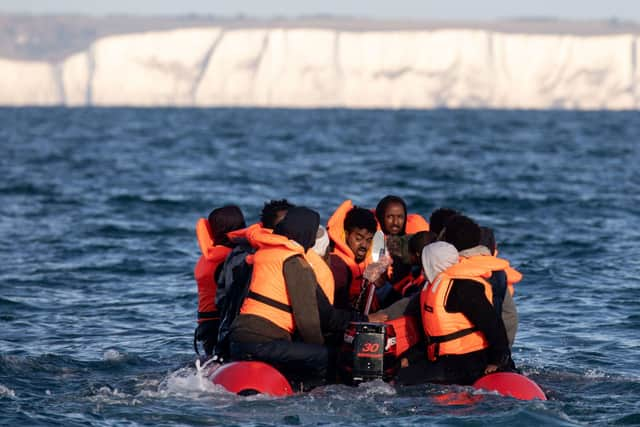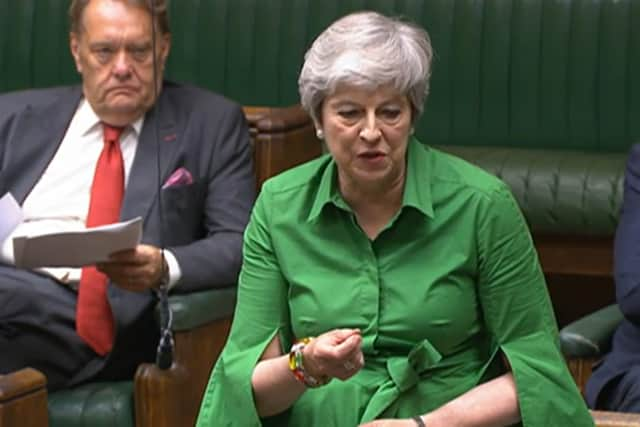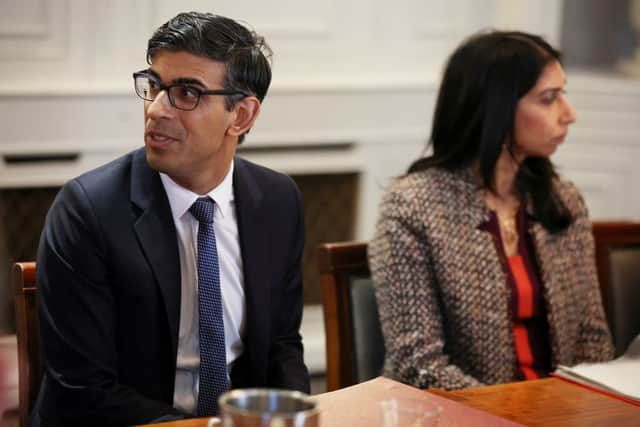Illegal Migration Bill: what is and isn’t included in new asylum law explained after MPs reject amendments
and live on Freeview channel 276
The UK’s controversial Illegal Migration Bill is set to become law after the government saw off a series of amendments proposed by the House of Lords.
Late on Monday (17 July), MPs voted to reject the latest amendments by peers, meaning the draft legislation - which Prime Minister Rishi Sunak and Home Secretary Suella Braverman introduced as a way to tackle ‘small boats crossings’ - was sent back to the Lords and ultimately passed. A few Tory MPs, such as former Prime Minister Theresa May, Iain Duncan Smith, and Damian Green, rebelled against the whip - but the government still prevailed in all nine votes.
Advertisement
Hide AdAdvertisement
Hide AdIt marked an end to the recent Parliamentary “ping pong” of the Illegal Migration Bill - with the proposed new law being passed back-and-forth between the Commons and the Lords. This included last-ditch attempts by peers to remove some of the bill’s more contentious aspects, which charities and campaigners have previously warned would put the UK in violation of human rights law and the Refugee Convention.
Some of the changes the House of Lords proposed included moves to protect LGBTQ+ people being deported to certain countries, calling for more safe and legal routes to be introduced for asylum seekers, seeking greater protections for victims of modern slavery, and reducing the amount of time for which refugee children and pregnant women can be detained.
These amendments were rejected by MPs, although not without controversy. Many senior Tories rebelled and spoke out against the draft legislation, with former Prime Minister May warning it would “consign more people to slavery” and enable traffickers to “make money out of human misery”.


The government offered some concessions in an attempt to help the bill pass more easily, but following the latest push for amendments from the House of Lords, a source told The Guardian that the Home Office would no longer back down: “There will be no more concessions. It won’t be us who blinks again.”
Advertisement
Hide AdAdvertisement
Hide AdMeanwhile immigration minister Robert Jenrick also criticised the House of Lords for continuing to make amendments to the bill - urging peers to end the stand-off. He said: “It is time for the clear view of the elected house to prevail... uphold the will of the democratically elected Commons... and to get on with securing our borders and stopping the boats.”
So, now that the Illegal Migration Bill is set to become law - what exactly does it do, what changes were proposed, and what, if any, concessions did the government make? Here’s everything you need to know about the controversial ‘small boats bill’.
What is in the Illegal Migration Bill?
Back in March, Sunak and Braverman unveiled their plan to crack down on ‘small boats crossings’ - a topic which the Prime Minister listed as a priority when outlining his five key pledges in January. To pursue this, they created the Illegal Migration Bill, which means that any migrant deemed to have arrived in the UK ‘illegally’ or through ‘irregular routes’ will be prevented from claiming asylum.
This would be done by giving the Home Secretary sweeping new powers to immediately detain asylum seekers without bail or judicial review, before removing them from the UK - either by returning them to their country of origin or deporting them to a “third country” such as Rwanda.
Advertisement
Hide AdAdvertisement
Hide AdRefugees and migrants would also then be banned from ever returning to the UK - and blocked from seeking citizenship. Announcing the plans, Sunak described this as “fair for those at home” and “for those who have a legitimate claim to asylum”, adding: “My policy is very simple. It is this country, and your government, who should decide who comes here.”
But the proposed new legislation faced significant backlash. Following the announcement, EU Commissioner Ylva Johansson revealed she personally told Braverman that she believes her asylum plan “violates” international law, while many human rights charities said the new legislation will breach the European Convention on Human Rights, as well as the UN’s 1951 Refugee Convention.


Others have argued that in addition to being “immoral”, the Illegal Migration Bill also will not succeed in reducing immigration. Tara Povey, policy and research manager at Refugee Action, previously told NationalWorld: “The idea of the Illegal Migration Bill is to make conditions so bad for people seeking asylum that they cease coming to the UK.
“But this policy of deterrence has been proven to be ineffective,” she argued, pointing to previous research conducted internally by the Home Office which found that creating a “hostile” environment for migrants did not reduce the number attempting to come to the UK.” These kind of arguments have meant the Illegal Migration Bill has faced trouble passing through Parliament, with the recent “ping-pong” only the latest of its woes.
What amendments did the House of Lords propose?
Advertisement
Hide AdAdvertisement
Hide AdPeers in the House of Lords suggested several changes be made to the Illegal Migration Bill. They asked the Home Secretary to establish new “safe and legal routes” for refugees to come to the UK, and requested asylum claims must be processed if the person has not been removed within six months.
In a further amendment, they said people from the LGBTQ+ community should be prevented from being removed to certain countries where they may be unsafe, and asked that exisiting protections be maintained for unaccompanied children and victims of trafficking or modern slavery.
Other changes included a proposal that refugee children detained for the purpose of deportation should be granted immigration bail after eight days - down from the 28 days previously outlined in the draft legislation. Peers also asked for a change in detention time for pregnant women seeking asylum, saying they should only be able to be detained for a maximum of 72 hours - again down from the previous 28 day proposal.
What concessions did the Home Office make?
On 10 July, the Home Office offered some concessions on the bill - with more than 10,000 migrants set to be spared automatic deportation to Rwanda after ministers agreed to abandon plans to apply new powers of automatic detention and deportation to any asylum seeker who arrived after 7 March - the date when the ‘small boats’ bill was presented to Parliament.
Advertisement
Hide AdAdvertisement
Hide AdPreviously, the Home Office wanted to the bill to be retrospective to prevent a surge in asylum seekers trying to reach the UK before it becomes law, but now, the powers will only come into force once the Illegal Migration Bill has passed through all legislative stages and has been granted Royal Assent.
In April, the Home Office made another amendment - pledging that refugee children would only be detained in the UK in “exceptional” circumstances and only deported to another country in “very limited” ones, such as for a family reunion. Prime Minister Sunak moved to “enhance the safeguarding” of children under the draft legislation following calls from backbench Conservative MPs, in an apparent move to avoid an in-party rebellion.


But the government has also made concessions to those on the right-wing of the Tory Party, with Sunak and Braverman announcing in April an amendment to the Illegal Migration Bill that would mean the government could ignore orders from human rights judges who attempt to block migrant deportation flights from the UK.
Under the change, ministers would be given the legal authority to disregard ‘Rule 39’ injunction orders from the European Court of Human Rights, which can prevent migrants from being deported where there is “a real risk of serious and irreversible harm”. This is what happened to the first flight of asylum seekers meant to head for Rwanda.
What happens next?
Advertisement
Hide AdAdvertisement
Hide AdAfter MPs vetoed the peers’ amendments, the Illegal Migration Bill was sent back to the House of Lords and the legislation passed. Now, the bill will need to receive royal assent from King Charles III in order to officially become law.
Ministers are hoping it will pass before Parliament’s summer recess, but it is unclear whether this will happen - or whether any more last-ditch challenges will be made in an attempt to stop the controversial legislation.
Comment Guidelines
National World encourages reader discussion on our stories. User feedback, insights and back-and-forth exchanges add a rich layer of context to reporting. Please review our Community Guidelines before commenting.
